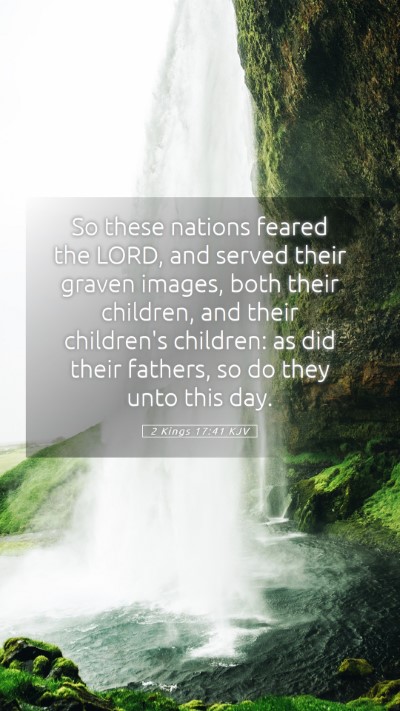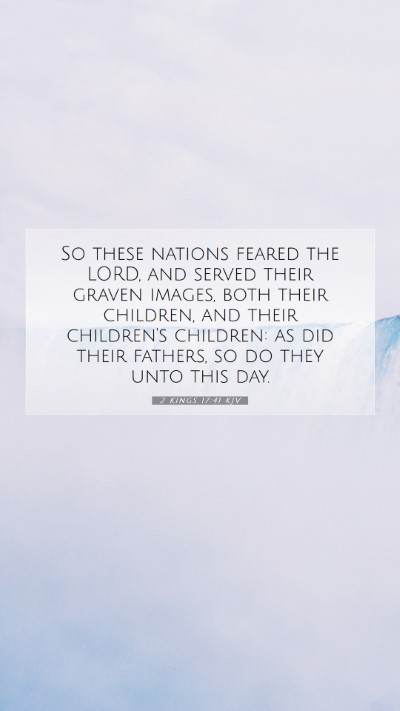Bible Verse Meaning and Interpretation of 2 Kings 17:41
This passage from 2 Kings 17:41 provides profound insights into the spiritual disengagement and syncretism among the inhabitants of Israel following the Assyrian conquest. It states, "So these nations feared the Lord, and served their graven images, both their children, and their children's children: as did their fathers, so do they unto this day."
Contextual Overview
The verse comes at a time when the kingdom of Israel was estranged from God, highlighting the consequences of idolatry and the adoption of pagan customs. The people attempted to serve Yahweh while simultaneously clinging to their images—a reflection of a divided loyalty that warrants scrutiny and reflection.
Commentaries on 2 Kings 17:41
Matthew Henry's Commentary
Matthew Henry emphasizes the dualistic worship pattern adopted by the Israelites, wherein they feared the Lord but remained committed to idolatry. He indicates that this syncretism illustrates a significant failure in their understanding of divine allegiance. Those that seek to serve God while indulging in worldly practices live in a state of spiritual compromise.
Albert Barnes' Notes
Barnes points out that the term "graven images" refers to the rituals and objects of worship that were co-opted from surrounding pagan nations. He elaborates that this highlights the insufficiency of mere fear of the Lord without true devotion and submission. Barnes argues that such practices often lead to a generational perpetuation of spiritual error, as seen in the mention of "both their children, and their children's children."
Adam Clarke's Commentary
Clarke provides an in-depth historical and cultural analysis, noting how the influence of neighboring nations shaped Israel's worship practices. He reflects on the futility behind serving God alongside idols, as it ultimately results in alienation from true divine favor. Clarke underlines that understanding the historical context is crucial for interpreting this passage accurately.
Significance of 2 Kings 17:41
- Reflection of Human Nature: This verse holds a mirror to the human tendency to blend religious practices conveniently, often leading to confusion and misplaced priorities in spiritual life.
- Insight into Generational Patterns: The mention of children and their children's children shows how spiritual beliefs and practices are often passed down, which can either be a blessing or a curse depending on the fidelity to God.
- Call to True Worship: This passage is a reminder of the importance of undivided loyalty to God, urging believers to examine their own lives for similar tendencies toward idolatry, even in subtle forms.
Cross References
- Exodus 20:3-5: The Ten Commandments warning against idolatry.
- Matthew 6:24: The teaching that no one can serve two masters.
- James 1:8: A double-minded man is unstable in all his ways.
Bible Verse Study Insights
This verse invites readers to engage in Bible study by examining how fear and worship of God interact with cultural influences. It serves as a basis for useful Bible study lessons and discussions in Bible study groups. The insights offered by various commentators provide a layered understanding that can enhance online Bible study and further exploration of scriptural themes.
Conclusion
Ultimately, understanding Scripture, especially passages like 2 Kings 17:41, is crucial for grasping the larger narrative of God's relationship with His people. These insights remind believers of the necessity of aligning their practices with genuine devotion to God, avoiding the pitfalls of syncretism and spiritual complacency.


